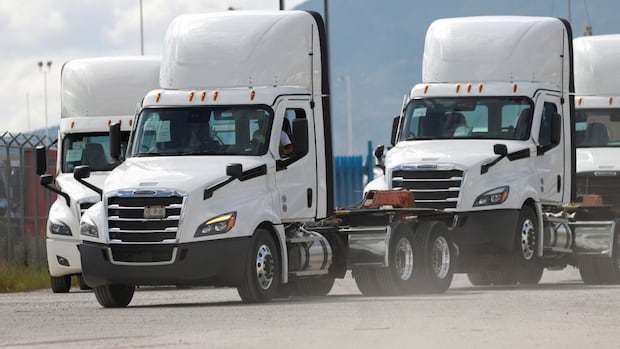The rumble of diesel engines crossing the Canada-U.S. border has been muffled by the harsh economic reality of President Donald Trump’s latest tariff salvo. Canadian medium and heavy-duty truck manufacturers now face a punishing 25% tariff on exports to their largest market, sending shockwaves through an industry that ships approximately $3.7 billion in trucks to the U.S. annually.
“This isn’t just a speed bump—it’s a roadblock,” says Thomas Ferguson, CEO of Manitoba-based Northern Fleet Manufacturing, which derives 70% of its revenue from U.S. sales. “Overnight, our products became 25% more expensive in our primary market. The math simply doesn’t work anymore.”
The tariffs, implemented last week under Section 232 of the Trade Expansion Act, target vehicles with gross weights exceeding 8,800 pounds—a category encompassing everything from delivery vans to 18-wheelers. For Canadian manufacturers, whose production lines are deeply integrated with U.S. supply chains, the impact has been immediate and severe.
Industry data reveals the vulnerability of Canada’s truck manufacturing sector to these measures. According to Transport Canada figures, the U.S. market accounts for nearly 83% of Canadian truck exports, with over 41,000 units crossing the border last year alone. Canadian plants in Ontario and Quebec produce vehicles for major brands including Freightliner, Kenworth, and Peterbilt.
“We’re talking about high-skilled jobs that pay well above the national average,” notes Avery Chen, senior economist at the Canadian Vehicle Manufacturers’ Association. “For every assembly line position, there are approximately seven jobs in the supply chain. The ripple effects of these tariffs will be felt far beyond the factory floor.”
The Canadian government has responded with promises of support while simultaneously pursuing diplomatic and legal channels. Trade Minister Mary Ng has characterized the tariffs as “unjustified and harmful to workers on both sides of the border” while confirming that Canada is exploring potential World Trade Organization challenges.
On factory floors across the country, the immediate concern is survival. Manufacturers face impossible choices: absorb the 25% cost increase and operate at a loss, raise prices and lose market share, or drastically cut production and workforce.
“We’ve already had to pause our expansion plans and are reviewing staffing levels,” says Ferguson. “The cruel irony is that many of the components we use come from U.S. suppliers. This tariff hurts their business too.”
Industry analysts from CO24 Business point to a troubling precedent. When similar tariffs were briefly imposed in 2018, Canadian manufacturers reported order cancellations within days. This time, with no clear end date, companies must plan for prolonged market disruption.
The timing couldn’t be worse for the sector. After navigating pandemic-related supply chain challenges and rising input costs, manufacturers had just begun to see stabilization. Now, as reported in CO24 Breaking News, some companies are accelerating plans to diversify their export markets, looking to Europe and Australia as potential alternatives.
“You can’t replace the U.S. market overnight,” explains Chen. “The proximity, regulatory alignment, and sheer size make it irreplaceable in the short term. Companies will need to find creative solutions just to weather this storm.”
For communities built around truck manufacturing, the stakes are particularly high. In Sainte-Thérèse, Quebec, where nearly 1,200 workers assemble medium-duty trucks, the economic ecosystem extends to hundreds of local businesses.
Meanwhile, U.S. truck buyers are already feeling the squeeze of reduced competition and higher prices. Fleet operators who previously relied on Canadian-built vehicles report facing delivery delays and cost increases that will inevitably be passed on to consumers.
As covered extensively in CO24 Sports, even specialized vehicles used for transporting sporting equipment and team transport could see significant price hikes, adding unexpected costs to everything from professional leagues to community teams.
The road ahead remains uncertain. Canadian negotiators continue pressing for exemptions, highlighting the integrated nature of North American manufacturing and the security implications of disrupting critical supply chains. Until then, truck manufacturers and their employees find themselves caught in the crosshairs of a trade dispute with no clear off-ramp in sight.














